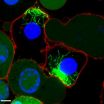(Press-News.org) A new study from the interdisciplinary Interacting Minds Centre at Aarhus University examines the difference between American and Danish attitudes to welfare services. Even though the two countries are traditionally portrayed as being miles apart in this respect, the study concludes that the difference between the ways the two societies are organised is not due to fundamental differences in attitude about when the state should provide financial assistance for citizens.
"The study challenges the conventional wisdom that we Danes are more inclined to play the Good Samaritan than the Americans are. In fact our study shows that the attitudes of Danes and Americans with regard to welfare services are very similar," explains Michael Bang Petersen, a professor at the Department of Political Science and Government at Aarhus University. He and his colleague Lene Aarøe, who is an assistant professor at the same department, are responsible for the study. They are both affiliated with the Interacting Minds Centre.
Happy to help unlucky people – but not lazy ones!
They have studied the attitudes of Danes and Americans with regard to three specific cases describing people living off welfare benefits. A questionnaire presented respondents with three different types of welfare client:
1) One person whose situation or background they knew nothing about.
2) One person who had always had a regular job but was now the victim of a work-related injury. He is trying hard to find a new job, and is highly motivated to get back onto the labour market.
3) And one person who is obviously lazy and refuses to lift a finger to look for a job.
The study covered a representative cross-section of Danes and Americans (1,000 individuals from each country).
The respondents were asked to agree or disagree with the idea that these three individuals should face tougher demands before being granted welfare benefits.
The Danes were slightly more inclined than the Americans to sympathise with the person on welfare whose background they knew nothing about. But with regard to cases 2 and 3, the Americans and Danes were in complete agreement. They were both happy to help unlucky people – but not lazy ones! So what does this tell us about Danes and Americans?
"The idea that Danes are in favour of welfare and Americans are against it is not based on fundamental differences in values. It's all about Danes tending to regard people on welfare as unlucky, while Americans tend to regard them as lazy," explains Lene Aarøe.
Primitive instincts
In other words, a deeply embedded sense of solidarity is not what drives our support for the welfare state. According to the researchers, the explanation is more to do with biology and psychology.
"Even right back in the Stone Age we were forced to decide whether it was worth our while to share things with other people. The reason for sharing is that we expect to get something back if we ever need help ourselves. In other words, our willingness to help other people rests on an expectation of reciprocal help. If we don't think we're going to get anything back, we're less willing to help – or not willing to help at all. That's the way our brains work," says Michael Bang Petersen.
The same mechanism applies when we consider people on welfare:
"When we assess people on welfare, we use certain psychological mechanisms to spot anyone who might be cheating. We ask ourselves whether they are motivated to give something back to me and society. And these mechanisms are more powerful than cultural differences," he says.
This is why Danes and Americans alike can change their opinions very rapidly when they are given some insight into the situation facing people on welfare.
Political stereotypes work
The study can also shed light on why stereotypical cases like the Danish welfare clients known as "Lazy Robert" and "Poverty-stricken Carina" play a role in the political debate. The politicians use such cases as illustrative tools to support their own political agendas, depending on how they refer to the individuals involved. The study confirms that the strategy of these politicians works.
"Politicians can use the study to learn that the way they label people on welfare – by calling them 'lazy' or 'unlucky', for instance – can easily have a big impact on people's attitudes to people on welfare," says Lene Aarøe.
INFORMATION:
Read more:
"Crowding Out Culture: Scandinavians and Americans Agree on Social Welfare in the Face of Deservingness Cues", Lene Aarøe & Michael Bang Petersen First View Article i Journal of Politics
"Just two sentences make Americans as pro-welfare as Danes", an article on the Washington Post's political science blog
Have you been unlucky -- or are you just lazy?
2014-06-23
ELSE PRESS RELEASES FROM THIS DATE:
New research proves gender bias extraordinarily prevalent in STEM careers
2014-06-23
NEW YORK — With everyone from the federal government to corporate America working to encourage more women to pursue careers in science, technology, engineering and math (STEM) fields, you would think the doors would be wide open to women of all backgrounds. A new study from Columbia Business School shows that this could not be further from the truth and that gender bias among hiring managers in STEM fields is extraordinarily prevalent.
"How Stereotypes Impair Women's Careers in Science," written by Ernesto Reuben, assistant professor of management at Columbia Business ...
We can eliminate the major tornado threat in Tornado Alley
2014-06-23
The annually recurring devastating tornado attacks in US Tornado Alley raise an important question: Can we eliminate the major tornado threat in Tornado Alley? Some people may claim that such a question is beyond imagination as people are powerless in facing violent tornadoes. However, according to Professor Rongjia Tao's recent publication in IJMPB, human beings are not powerless on this issue: if we build three east-west great walls in Tornado Alley, we will eliminate major tornado threat there forever. These walls can be built locally at high tornado risk areas to eliminate ...
Not even cell death can stop the alarm
2014-06-23
Even after a cell dies, components of the immune system remain active and continue to fuel inflammatory reactions. An international team of researchers under the direction of scientists from the Institute of Innate Immunity at the University Hospital of Bonn has discovered how this incredible form of communication works. The findings offer potentially novel approaches for therapies against many serious diseases that affect a large part of the population, such as gout, atherosclerosis and Alzheimer's disease. The exciting new results are now published in the renowned journal ...
LED phosphors: Better red makes brighter white
2014-06-23
Chemists at Ludwig-Maximilians-Universitaet (LMU) in Munich have developed a novel type of red phosphor material, which significantly enhances the performance of white-emitting LEDs.
In cooperation with Dr. Peter Schmidt of Philips Technologie GmbH in Aachen, a team of researchers led by Prof. Dr. Wolfgang Schnick, who holds the Chair of Inorganic Solid-State Chemistry at LMU Munich, has developed a new material for application in light-emitting diodes (LEDs). "With its highly unusual properties, the new material has the potential to revolutionize the LED market," says ...
Magnetic fields to measure positions of ferromagnetic objects accurately
2014-06-23
Many creatures in nature, including butterflies, newts and mole rats, use the Earth's inherent magnetic field lines and field intensity variations to determine their geographical position. A research team at the University of Minnesota has shown that the inherent magnetic fields of ferromagnetic objects can be similarly exploited for accurate position measurements of these objects. Such position measurement is enabled in this research by showing that the spatial variation of magnetic field around an object can be modeled using just the geometry of the object under consideration. ...
The colon has a safety mechanism that restricts tumor formation
2014-06-23
Colon cancer development starts with the formation of benign tumours called adenomas. It is estimated that between 30% and 50% of people over 50 will develop one of these tumours. These adenomas or polyps are the pre-cancerous lesions that, once they accumulate further genetic mutations over many years, can progress to colon cancer. A team headed by scientists at the Institute for Research in Biomedicine (IRB Barcelona) and headed by the ICREA researcher Eduard Batlle has discovered that the colon has a safety mechanism to restrict the formation and growth of adenomas. ...
Researchers discover new genes that promote brain cancer
2014-06-23
La Jolla, Calif., June 22, 2014, A new collaborative study carried out by researchers at Sanford-Burnham Medical Research Institute (Sanford-Burnham), UC San Diego, the German Cancer Research Center, the University of Heidelberg (Germany), and 33 other research institutions has identified two oncogenes, called GFI1 and GFI1B, that drive the development of medulloblastoma, the most common malignant brain tumor in children.
The findings, published June 22 in Nature, suggest that GFI1 and GFI1B are worthy gene candidates for molecular-targeted therapy.
"Using state-of-the-art ...
Vitamin D can lower weight, blood sugar via the brain
2014-06-23
CHICAGO, IL—Women with type 2 diabetes and high cholesterol are less likely than their male peers to reach treatment goals to lower their "bad" cholesterol, or low-density lipoprotein (LDL) cholesterol, despite access to cholesterol-lowering medication, a Canadian study finds. The results were presented on Saturday at the joint meeting of the International Society of Endocrinology and the Endocrine Society: ICE/ENDO 2014 in Chicago.
Although other research has shown a similar gender gap in reduction of LDL cholesterol among adults with diabetes, the new study found that ...
Low number of taste buds linked to older age, higher fasting blood sugar
2014-06-23
CHICAGO, IL—A study finds that the number of taste buds we have on our tongue decreases as we get older, and that the lower the number of taste buds, the more likely for fasting blood glucose (sugar) levels to be higher than normal. The results were presented Sunday at the joint meeting of the International Society of Endocrinology and the Endocrine Society: ICE/ENDO 2014 in Chicago.
Because high fasting blood sugar level is a main characteristic of diabetes, the study findings suggest that the number of taste buds plays a role in glucose metabolism—how the body uses ...
Growth hormone defect may protect against diabetes, cancer in unique ecuador population
2014-06-23
CHICAGO, IL — People who lack growth hormone (GH) receptors also appear to have marked insulin sensitivity that prevents them from developing diabetes and lowers their risk for cancer, despite their increased percentage of body fat, new research finds. The results were presented Sunday, June 22, at ICE/ENDO 2014, the joint meeting of the International Society of Endocrinology and the Endocrine Society in Chicago.
"We have shown that people who, due to a genetic defect, are unable to respond to growth hormone have an increased sensitivity to insulin that safeguards them ...



